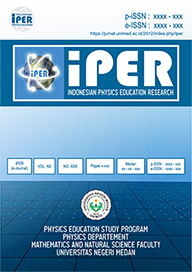THE EFFECTIVENESS OF LEARNING USING E-MODULES BASED ON PROBLEM BASED LEARNING TOWARDS PHYSISCS STUDENT LEARNING OUTCOMES
Abstract
This research aims to design e-module based on problem based learning in work and energy materials. This research method uses Research and Development (R&D) with ADDIE model that are Analysis, Design, Development, Implementation, Evaluation. The research population was students in SMA Negeri 1 Tanah Pinem Class X Science. The data instruments used in this research consisted of validation questionnaires for material expert, media expert, teacher, and student responses questionnaires. The effectiveness quality of the e-module is seen from the pretest and posttest results with N-gain of 0.78 in the high category which shows that the class had increase learning outcomes in the high category. Based on the data, it can be concluded that the e-modules based on problem based learning on work and energy materials are valid and effective.
Keywords
References
A. Astalini, Dwi A. Kurniawan, Nugroho Kurniawan & Lika Anggraini. (2019). Evaluation of Student’s Atitude Toward Science in Indonesia. Journal for Educational Research, 2019, 3(1), 1-12.
Hake, Richard R. (1998). “Interactive-Engagement versus Traditional Methods: A Six-Thousand-Student Survey of Mechanics Test Data for Introductory Physics Courses.” American Journal of Physics 66 (1): 64–74.
Made Wisnu Adi Pramana, I Nyoman Jampel, dan Ketut Pudjawan,(2020) Meningkatkan Hasil Belajar Biologi Melalui E-Modul Berbasis Problem Based Learning, Jurnal EDUTECH Universitas Pendidikan Ganesha, 8(2), 17-32
Megawanti, P. Meretas Permasalahan Pendidikan di Indonesia. Jurnal Formatif. 2(3): 227-234
Saniman, Nurdin Bukit dan Mariati P.S. (2015). Efek Model Problem Based Learning Dan Pemahaman Konsep Fisika Terhadap Hasil Belajar Siswa. Jurnal Tabularasa PPS Unimed, 12 (2), 130-139
Sudjana. (2007). Metode Statistika. Bandung: PT. Tarsito Bandung.
Sugiyono. (2011). Motede Penelitian Kuantitatif, Kualitatif, dan R&D. Bandung: Alfabeta.
Siswanto, Maridi, dan Marjono. (2012). Pengaruh Model Problem Based Learning (Pbl) Terhadap Kemampuan Memecahkan Masalah Dan Hasil Belajar Kognitif Biologi Siswa Kelas Vii Smp Negeri 14 Surakarta Tahun Pelajaran 2011/2012, Jurnal Pendidikan Biologi, 4(2), 53-59
Tambunan,E dan Bukit, N. (2015). Analisis Pengaruh Model Pembelajaran Kooperatif Tipe Group Investigation dan Pemahaman Konsep Awal Terhadap Hasil Belajar Siswa di SMA Negeri 1 Teluk Mengkadu. Jurnal Pendidikan Fisika. 4(1), 49-56
Torp, Linda, and Sara Sage. (2002). Problems as Possibilities: Problem-Based Learning for K-16 Education (2nd Ed.). Alexandria, VA: Association for Supervision and Curriculum Development.
Qomariyah, S. N. (2019). Effect of Problem Based Learning Learning Model to Improve Student Learning Outcomes. International Journal of Educational Research Review, (2009), 217–222.
DOI: https://doi.org/10.24114/iper.v4i1.63097
Article Metrics
Abstract view : 41 timesPDF - 11 times PDF - 23 times
Refbacks
- There are currently no refbacks.

Ciptaan disebarluaskan di bawah Lisensi Creative Commons Atribusi 4.0 Internasional.




